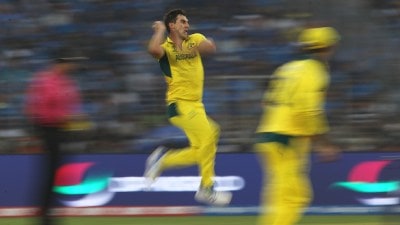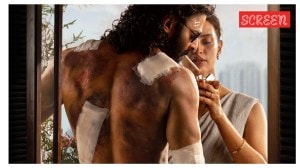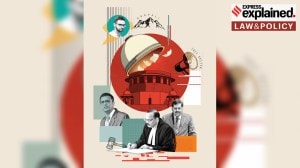Citygritty 8212; Pune
Threshold of painWhom do you hold responsible when an accident kills your only daughter? An irresponsible truck driver, a chaotic traffic si...

Threshold of pain
Whom do you hold responsible when an accident kills your only daughter? An irresponsible truck driver, a chaotic traffic situation, an insensitive society? These were some of the pertinent questions that a play-reading of Vidyasagar Mahajan8217;s Nashtachakra threw up before the audience at the Patrakar Bhavan auditorium on the evening of November 3.
Organised by Kalasakta, the reading had Vikram Gokhale, Ila Bhate and Meera Velankar reading out the parts of the father, mother and daughter respectively, with Anshuman Apte acting the narrator8217;s part.
The play, based on a real incident, starts with the accidental death of Prajakta while the rest of the action revolves around how the trauma-stricken parents come to terms with their grief in an indifferent society. When they are unable to sustain an organisation of other similarly-placed parents because of public apathy and hypocritical officialdom, the parents slowly lose touch with reality. Ravaged by the nightmares of the accident, their condition finally takes them to the psychiatrist8217;s couch but in vain.
Just how effective words and voice modulation, without the support of dramatic action, can be, was amply demonstrated through the reading. If the aim of this play was to throw the audience into a state of agitation, the volley of questions posed to the cast, the writer and the director, Vikram Watave, at a question-and-answer session after the play, showed that it had indeed been served.
Not falling in line
There is a board that states this is an auto-rickshaw stand, there is a policeman manning it and there are passengers who stand in a queue for the rickshaw. But where are the rickshaws? At the Pune Railway Station, rickshaws generally form a queue, waiting to ferry passengers to their destinations. But on November 3, there were hardly any three-wheelers waiting for passengers. The few in line were those who had driven in to drop other passengers and had been summoned by the policeman. So it took about five to 10 minutes to get a rickshaw. At the same time, there were plenty rickshaws available on the other side of the station, where there is no compulsion on the drivers to take even short-distance commuters. There may be rules and regulations, but rickshaw drivers sure have a way of circumventing them.
A-peeling gesture?
Any other time it may not seem very flattering but when city Congress chief Mohan Joshi and former mayor Vithal Ladkat were welcomed by supporters with garlands of onions at the Chhatrapati Shivaji Market Yard on November 3, it was a generous gesture on their part indeed, given the vegetable8217;s price and scarcity these days. Joshi and his supporters were there to protest the State Government8217;s decision to sell onions at Rs 15 per kg on every ration card in Mumbai, and not other parts of Maharashtra, and stop trucks heading towards the metro with this precious cargo. However, along with discussing the government8217;s scheme, there was also speculation amongst those gathered as to what the two politicians planned to do later with their priceless garlands. Discard them like one normally does the floral variety? No way. As the agitation came to an end around lunch-time, the leaders ordered a round of bhel for everyone and proceeded to utilise the onions from the garlands to garnish the bhel! Talk about beingpragmatic.
- 01
- 02
- 03
- 04
- 05































